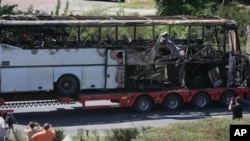LONDON —
The Bulgarian government says Hezbollah was responsible for the bombing of a tourist bus near a Black Sea port city last year in which five Israelis and one Bulgarian were killed. The accusation implicates a group whose political wing is a major force in Lebanon’s government.
Bulgaria’s Interior Minister Tsvetan Tsvetanov made the announcement Tuesday in Sofia. The minister said genetic material led investigators to conclude that two Hezbollah operatives were among the three men responsible for the attack. But investigators found no direct link to Hezbollah’s backers in Iran or to the al-Qaida terrorist network.
On July 12 last year, a bomb exploded on a bus carrying an Israeli youth group at an airport near Burgas. In addition to those killed, 32 Israelis were wounded, most of them children. Another man was also killed, and he was believed to be a suicide bomber.
But on Tuesday, the director of the European Union’s police agency, Rob Wainwright, told The Associated Press that it may have been a sophisticated remotely controlled bomb that destroyed the bus. Wainwright also endorsed the Bulgarian conclusion that the attack originated in Lebanon, but said the specific link to Hezbollah is less certain.
“From what I've seen on the case from very strong links, obvious links to Lebanon, from the modus operandi of the terrorist attack, from other intelligence that we see, I think that's reasonable assumption," Wainwright said. "I also have my suspicion at least that either Hezbollah itself is responsible for this, or it was carried out by people that are closely associated with that group.
Still, the European police official called the Bulgarian findings “significant” because this would be the first successful Hezbollah attack in Europe in nearly 30 years.
The Bulgarian conclusion confirms initial Israeli government charges about the source of the attack. Both Hezbollah and Iran have denied involvement.
The United States and the European Union have praised the Bulgarian investigation and denounced Hezbollah for its alleged role in the attack. A White House statement called on European countries to take action to find Hezbollah operational and financial cells on the continent.
The EU foreign policy chief Catherine Ashton said member countries need to seriously assess the investigation’s findings and “discuss the appropriate response.”
Bulgaria’s Interior Minister Tsvetan Tsvetanov made the announcement Tuesday in Sofia. The minister said genetic material led investigators to conclude that two Hezbollah operatives were among the three men responsible for the attack. But investigators found no direct link to Hezbollah’s backers in Iran or to the al-Qaida terrorist network.
On July 12 last year, a bomb exploded on a bus carrying an Israeli youth group at an airport near Burgas. In addition to those killed, 32 Israelis were wounded, most of them children. Another man was also killed, and he was believed to be a suicide bomber.
But on Tuesday, the director of the European Union’s police agency, Rob Wainwright, told The Associated Press that it may have been a sophisticated remotely controlled bomb that destroyed the bus. Wainwright also endorsed the Bulgarian conclusion that the attack originated in Lebanon, but said the specific link to Hezbollah is less certain.
“From what I've seen on the case from very strong links, obvious links to Lebanon, from the modus operandi of the terrorist attack, from other intelligence that we see, I think that's reasonable assumption," Wainwright said. "I also have my suspicion at least that either Hezbollah itself is responsible for this, or it was carried out by people that are closely associated with that group.
Still, the European police official called the Bulgarian findings “significant” because this would be the first successful Hezbollah attack in Europe in nearly 30 years.
The Bulgarian conclusion confirms initial Israeli government charges about the source of the attack. Both Hezbollah and Iran have denied involvement.
The United States and the European Union have praised the Bulgarian investigation and denounced Hezbollah for its alleged role in the attack. A White House statement called on European countries to take action to find Hezbollah operational and financial cells on the continent.
The EU foreign policy chief Catherine Ashton said member countries need to seriously assess the investigation’s findings and “discuss the appropriate response.”
The co-founder of mideastnewswire.com, Nicholas Noe, calls that a “very cautious” response that does not come close to designating Hezbollah a terrorist organization, a move the United States made in the 1990s and has been urging the EU to do.
Noe says there is good reason to be cautious, and the case is “at a very early stage,” even after the eight-month Bulgarian investigation.
“This case appears, or at least is being billed by Hezbollah’s opponents – mainly Israel and the U.S. – as being a substantial case. So this could be a real game changer for in Europe. The observer of these events needs to be very careful in jumping to conclusions. There is a war going on. There is an information war going on, and there is a military war going on. Do I think it’s possible Hezbollah was involved? Absolutely I think it’s possible. But nothing is definitive right now," he said.
Nicholas Noe says a European decision to call Hezbollah a terrorist organization would have a significant impact on the group’s ability to operate, and he notes it could also endanger European peacekeeping troops in Southern Lebanon.
The issue is further complicated because Hezbollah’s political wing has a dominant position in Lebanon’s fragile government even though its military wing was blamed for a huge car bombing in Beirut in October that killed the chief of the country’s police intelligence unit.




